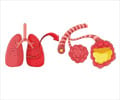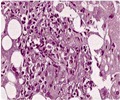Five medical organizations advise best practices for preventing hospital-associated pneumonia. Pneumonia is the most common healthcare-associated infection.

“Preventing hospital-acquired pneumonia is complicated because the diagnosis is often subjective and non-specific,” said Dr. Michael Klompas, first author of the guidance. “This complicates the interpretation of the prevention literature. The compendium helps distill the highest yield practices to prevent ventilator-associated events in ventilated patients and pneumonia in both ventilated and non-ventilated patients.”
Essential Practices
Evidences to prevent ventilator-associated pneumonia include:- Avoiding intubation
- Minimizing sedation
- Maintaining and improving physical conditioning
- Elevating the head of the bed
- Providing oral care with toothbrushing
- Providing early enteral rather than parenteral nutrition
- Maintaining ventilator circuits
This document, published in Infection Control and Hospital Epidemiology, updates the 2014 Strategies to Prevent Ventilator-Associated Pneumonia in Acute-Care Hospitals. The Compendium, first published in 2008, is sponsored by the Society for Healthcare Epidemiology (SHEA).
It is the product of a collaborative effort led by SHEA, the Infectious Diseases Society of America, the Association for Professionals in Infection Control and Epidemiology, the American Hospital Association, and The Joint Commission, with major contributions from representatives of a number of organizations and societies with content expertise.
Upcoming Compendium updates will include strategies to prevent catheter-associated urinary tract infections, Clostridium difficile infections, methicillin-resistant Staphylococcus aureus infections, and surgical site infections.
Hand hygiene also has a dedicated article. Each Compendium article contains infection prevention strategies, performance measures, and example implementation approaches.
Advertisement
Source-Eurekalert















